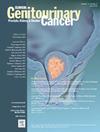Radical Surgery Compared to Bladder-Preserving Approaches for Limited Stage Small-Cell Bladder Cancer: Systematic Review and Meta-Analysis
IF 2.7
3区 医学
Q3 ONCOLOGY
引用次数: 0
Abstract
Background and Objective
Small-cell bladder cancer (SCBC) is an aggressive and rare malignancy for which there is no clear optimal treatment strategy. This systematic review and meta-analysis aimed to compare the median overall survival (OS) of patients with limited-stage (LS) SCBC treated with either cystectomy-based multimodal therapy (CBMMT) or radiation-based multimodal therapy (RBMMT).
Methods
A comprehensive search of PUBMED, Embase, and Scopus databases was performed for studies published before January 2024 according to the PRISMA guidelines. Studies have assessed LS-SCBC disease and provided survival data for subgroups of patients undergoing radical surgery or bladder-preserving approaches to be deemed eligible. Data extraction and quality assessment were independently conducted by 2 authors.
Key Findings and Limitations
Five studies comprising 1041 patients were analyzed. The pooled median OS for patients receiving RBMMT was 34.6 months (95% CI, 25.5-43.7), compared to 29.7 months (95% CI, 18.2-41.1) for those undergoing CBMMT. The main limitations are the retrospective nature of the included studies and the potential bias.
Conclusions and Clinical Implications
This meta-analysis indicates that RBMMT may provide comparable outcomes to CBMMT in LS-SCBC patients, supporting the consideration of bladder-preserving approaches in selected cases. RBMMT may offer a potential clinical benefit in terms of organ preservation for appropriately selected patients, although survival differences were not statistically significant.
有限期小细胞膀胱癌根治性手术与膀胱保留方法的比较:系统回顾和荟萃分析。
背景和目的:小细胞膀胱癌(SCBC)是一种侵袭性的罕见恶性肿瘤,目前尚无明确的最佳治疗策略。本系统综述和荟萃分析旨在比较以膀胱切除术为基础的多模式治疗(CBMMT)或以放射为基础的多模式治疗(RBMMT)治疗的有限期(LS) SCBC患者的中位总生存期(OS)。方法:根据PRISMA指南,对2024年1月前发表的研究进行PUBMED、Embase和Scopus数据库的综合检索。研究评估了LS-SCBC疾病,并为接受根治性手术或膀胱保留方法的患者亚组提供了生存数据。数据提取和质量评价由2位作者独立完成。主要发现和局限性:分析了包括1041例患者的5项研究。接受RBMMT的患者的总中位OS为34.6个月(95% CI, 25.5-43.7),而接受CBMMT的患者的总中位OS为29.7个月(95% CI, 18.2-41.1)。主要的限制是纳入研究的回顾性性质和潜在的偏倚。结论和临床意义:本荟萃分析表明,在LS-SCBC患者中,RBMMT可能提供与CBMMT相当的结果,支持在选定病例中考虑膀胱保留入路。RBMMT可能在器官保存方面为适当选择的患者提供潜在的临床益处,尽管生存差异没有统计学意义。
本文章由计算机程序翻译,如有差异,请以英文原文为准。
求助全文
约1分钟内获得全文
求助全文
来源期刊

Clinical genitourinary cancer
医学-泌尿学与肾脏学
CiteScore
5.20
自引率
6.20%
发文量
201
审稿时长
54 days
期刊介绍:
Clinical Genitourinary Cancer is a peer-reviewed journal that publishes original articles describing various aspects of clinical and translational research in genitourinary cancers. Clinical Genitourinary Cancer is devoted to articles on detection, diagnosis, prevention, and treatment of genitourinary cancers. The main emphasis is on recent scientific developments in all areas related to genitourinary malignancies. Specific areas of interest include clinical research and mechanistic approaches; drug sensitivity and resistance; gene and antisense therapy; pathology, markers, and prognostic indicators; chemoprevention strategies; multimodality therapy; and integration of various approaches.
 求助内容:
求助内容: 应助结果提醒方式:
应助结果提醒方式:


